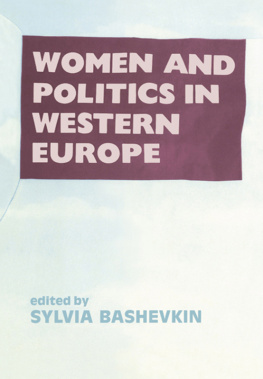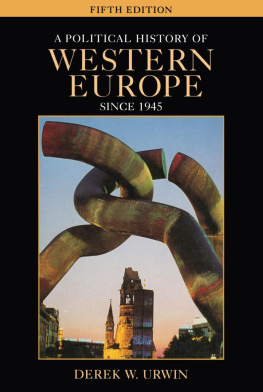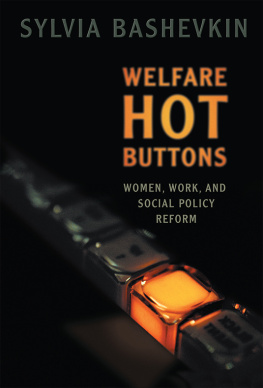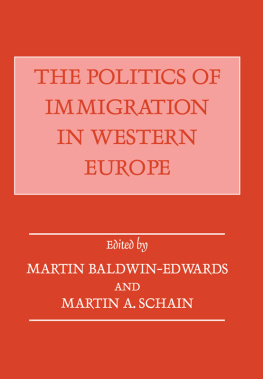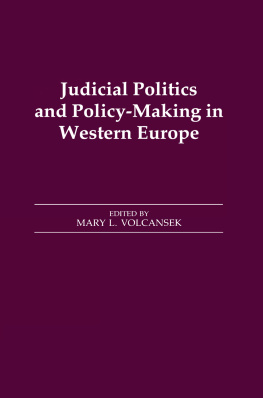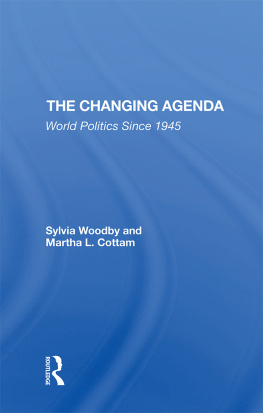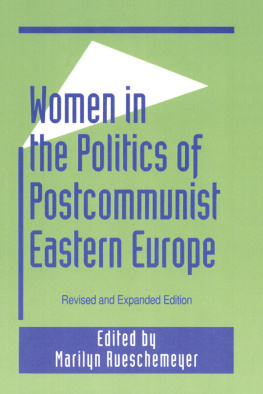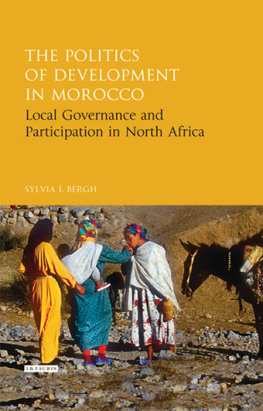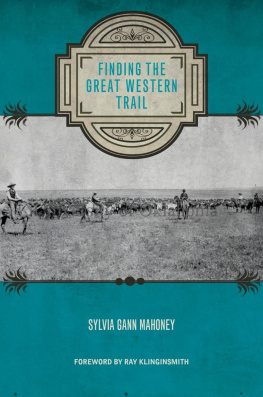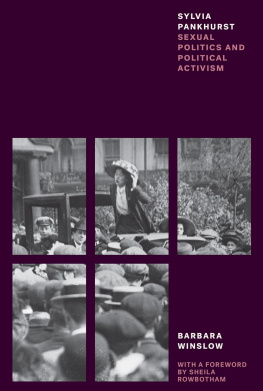WOMEN AND POLITICS
IN WESTERN EUROPE
WOMEN
AND POLITICS
IN WESTERN
EUROPE
Edited by
SYLVIA BASHEVKIN
First published in 1985 in Great Britain by
FRANK CASS AND COMPANY LIMITED
2 Park Square, Milton Park, Abingdon, Oxon, OX14 4RN
and in the United States of America by
FRANK CASS AND COMPANY LIMITED
270 Madison Ave, New York NY 10016
Transferred to Digital Printing 2006
Copyright 1985 Frank Cass & Co. Ltd.
British Library Cataloguing in Publication Data
Women and politics in Western Europe.
1. Women in politicsEurope
I. Bashevkin, Sylvia
323.34094HQ1236.5.E/
ISBN: 0-7146-3275-9
This group of studies first appeared in a Special Issue on Women and Politics in Western Europe of West European Politics, Vol.8, No.4, published by Frank Cass & Co. Ltd.
All rights reserved. No part of this publication may be reproduced, stored in a retrieval system or transmitted in any form or by any means, electronic, mechanical, photocopying, recording or otherwise, without the prior permission of Frank Cass and Company Limited.
Publishers Note
The publisher has gone to great lengths to ensure the quality of this reprint but points out that some imperfections in the original may be apparent
Contents
| Sylvia Bashevkin |
| Jane Jenson |
| Karen Beckwith |
| Lawrence C. Mayer and Roland E. Smith |
| Wayne Northcutt and Jeffra Flaitz |
| Ingunn Norderval |
| Pippa Norris |
Notes on Contributors
Sylvia Bashevkin is Assistant Professor of Political Science at the University of Toronto. She is the author of Toeing the Lines: Women and Party Politics in English Canada (1985) and editor of Canadian Political Behaviour (1985). Her recent articles include Social Change and Political Partisanship: The Political Attitudes of Women in Quebec, published in Comparative Political Studies (1983) and Changing Patterns of Politicization and Partisanship among Women in France, published in British Journal of Political Science (1985).
Karen Beckwith is Assistant Professor of Political Science at the College of Wooster in Wooster, Ohio. She has done extensive research on womens electoral representation and policy issues in both Italy and the United States, and is the author of American Women and Political Participation: The Impacts of Work, Generation, and Feminism (1986) as well as numerous articles and conference papers.
Jeffra Flaitz is a University Fellow in the Department of Learning and Instruction at the State University of New York at Buffalo. She is co-author of Women and Politics in Contemporary France (with Wayne Northcutt, 1983) and is preparing a dissertation on French Attitudes toward the Ideological Encumberedness of English as a Lingua Franca.
Jane Jenson is Professor of Political Science at Carleton University and Research Associate at the Center for European Studies, Harvard University. In addition to numerous articles on Canadian and comparative politics, she is co-author of Crisis, Challenge and Change (with M. Janine Brodie, 1980), Absent Mandate: The Politics of Discontent in Canada (1984), and The View from Inside: A French Communist Cell in Crisis (with George Ross, 1984). Her contribution forms part of a larger study of the state and gender relations in France.
Lawrence Mayer is Professor of Political Science at Texas Tech University. He is the author of Comparative Political Inquiry (1972), principal author of Politics in Industrial Societies (1977), and co-author of American Public Policy (1982). He has published articles on party systems as well as the state of the comparative politics discipline.
Ingunn Norderval teaches political science at Mre and Romsdal Regional College in Molde, Norway, and is a Labour member of the Provincial Assembly of Mre and Romsdal. She has published a number of studies of politics in Norway and, as a further result of her practical political work, is writing a history of local Labour Party organisation in Molde.
Pippa Norris is Senior Lecturer in Government at Newcastle Polytechnic. She has contributed articles on gender politics to Parliamentary Affairs, Social Policy , and Political Studies , and is the author of The Impact of Feminism (1986).
Wayne Northcutt is an Associate Professor of History at Niagara University in Lewiston, New York. He is the author of The French Socialist and Communist Party under the Fifth Republic, 19581981 (1985) as well as a number of articles on French political, social, and intellectual trends. Professor Northcutt is at present writing a political biography of Franois Mitterrand.
Roland Smith is Professor of Political Science at Texas Tech University. He is co-author of Patterns of Recruitment (1974) and has published several articles on American state government and politics.
Introduction
Sylvia Bashevkin
The modern womens movement has exerted a profound influence upon contemporary political thought, research, and action in Western Europe. Despite important differences within and cross-national in the ideological and political orientations of modern feminism, the overall impact of this movement has been pronounced, albeit largely unrecognised and unexplored within the Western European and especially European politics fields.
The publication of this volume represents an important step towards bringing research on women and organised feminism, on the one hand, and European politics, on the other, to the attention of area specialists. Unlike many earlier studies, it goes beyond both the critique of conventional political research as well as the chronicling of modern feminism to analyse systematically the implications of the womens movement for contemporary European political discourse, public opinion, party activity, and governmental process. To a large extent, then, these studies reflect a coming of age of both feminism and women and politics research. It is hoped that they will contribute to greater research and teaching in what remains a relatively neglected area of European politics.
Aside from encouraging increased interest and awareness of this field, the purpose of the present volume is to demonstrate the wide range of theoretical and empirical concerns which inform ongoing research on European women and politics. Due to space limitations, the study cannot claim to be comprehensive in treating all European nations or all aspects of women and politics. Nevertheless, it does identify common themes which point towards the political significance of recent changes in the social and economic status of West European women.
On a conceptual level, we open with a study by Jane Jenson of the challenge presented by the modern womens movement to the prevailing universe of political discourse in Western Europe. By situating the origins of this movement in the European new left of the late 1960s and following, Jenson provides an historical context for her argument that the treatment of women by the state in Western Europe has altered substantially during the past two decades. In particular, she highlights the altered terms of address to women in France, where debates in the 1970s concerning abortion and contraception reform illustrated the ability of the modern womens movement to re-shape conventional (including older feminist) definitions of womanhood as maternity. Through a careful analysis of this process, Jenson argues that the womens movement has successfully challenged but not necessarily transformed on a permanent basis the treatment of females within the universe of political discourse in Western Europe.


